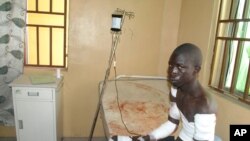Nigerian President Muhammadu Buhari has blamed thieving politicians for undermining the military’s fight against Boko Haram militants. But some analysts think the army's struggles result from more than just corruption.
A number of prominent figures connected to the administration of former president Goodluck Jonathan have been accused of corruption in recent weeks, including ex-national security adviser Sambo Dasuki and Alisa Metuh, the spokesman for Jonathan’s party.
Both are accused of diverting money meant to equip soldiers. Dasuki, perhaps the highest-profile case, is said to have approved over $2 billion in fictitious arms contracts, a charge he denies.
Boko Haram’s six-year long insurgency has killed about 20,000 people and forced more than two million Nigerians to flee their homes. Buhari campaigned on defeating the group and cracking down on corruption.
Information minister Lai Mohammed says the charges make clear the extent of that corruption under the previous government.
“It’s clear that that money was meant to fight terrorism. It was not used to fight terrorism,” Mohammed said.
More than corruption
When Boko Haram began taking control of territory in 2014, they repeatedly routed troops sent to stop them. Dispirited soldiers told stories of being sent into battle without enough ammunition.
By the start of last year, Boko Haram had seized territory in the northeast the size of Belgium. They lost most of that in the following months to a military offensive by Nigerian forces supported by foreign mercenaries and troops from neighboring countries.
Analysts and politicians have long debated how and why Nigeria’s army grew so weak, particularly since its soldiers are seen as having played an important role in West Africa’s response to the civil wars in Sierra Leone and Liberia.
Yan St-Pierre of the Berlin-based security firm MOSECON says corruption is only part of the reason for the military’s struggles in the northeast.
“The corruption part is indeed very true. Is it as large as to make Dasuki the kingpin of it all and to make it the core reason why the Nigerian army has so many problems fighting Boko Haram? It think that’s exaggerated and that’s sort of the [public relations] aspect,” St-Pierre said.
Rather, poor strategy and a lack of collaboration between Nigeria and neighboring countries is more to blame for the insurgency’s continued attacks, St-Pierre says.
“There’s really this rigid strategy, this rigid thought within the Nigerian army that prevents them, that doesn’t allow them to become flexible and realize that they have some issues and the way they’re running things isn’t that effective,” he said.
A better strategy would involve better collaboration with the police and more mobility of troops. “That rigidity prevents them from conducting proper military operations," he said.
Buhari said Nigeria met a self-imposed deadline at the end of last year and “defeated” Boko Haram, although he acknowledged civilian areas like bus stations and marketplaces were still at risk of suicide bombings.
Local media reported Boko Haram killed six people in a village in the northeast last week, while a suicide bombing killed four in a mosque in neighboring Cameroon.











